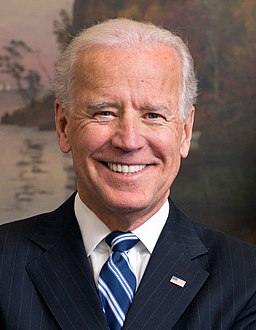OPINION: Debunking anti-loan forgiveness arguments
Attacking loan forgiveness is attack on what American public wants

Official portrait of Vice President Joe Biden in his West Wing Office at the White House, Jan. 10, 2013. (Official White House Photo by David Lienemann)..This official White House photograph is being made available only for publication by news organizations and/or for personal use printing by the subject(s) of the photograph. The photograph may not be manipulated in any way and may not be used in commercial or political materials, advertisements, emails, products, promotions that in any way suggests approval or endorsement of the President, the First Family, or the White House.
October 20, 2022
Anyone who pays even a little bit of attention to the news knows that the U.S. has a problem – a debt problem. In particular, a student debt problem.
Americans currently owe $1.75 trillion in private and federal loans, an average of almost $29,000 per borrower, according to Forbes.
During the 2020 presidential election, now-President Joe Biden campaigned with a platform that featured student loan forgiveness. Two years later, he followed through on his promise, officially opening applications for forgiveness of up to $20,000 in student debt.
According to AP News, most debt will be forgiven if applicants get their requests in by mid-November. And, yes, current borrowers can apply for relief!
This announcement is a monumental step that will bring some semblance of financial relief to nearly 43 million borrowers across the country.
And yet, there has still been significant pushback against the debt relief plan.
Arizona Attorney General Mark Brnovich said he “and others” were looking into their options to legally challenge the debt relief program, according to CNBC.
As of Wednesday, six red states – Arkansas, Iowa, Kansas, Missouri, Nebraska and South Carolina – filed a formal complaint against the program, arguing that the economy cannot support the forgiveness and that Biden does not have the legal ability to execute such sweeping legislation.
Biden’s loan plan was executed under the 2003 HEROES Act, which permits the executive branch special power over student loans during national emergencies, according to CNBC. According to the White House, President Donald Trump declared the pandemic a national emergency in March 2020.
Another argument conservatives have against student loan forgiveness is that it benefits the wealthiest of families, according to Vox. However, Biden’s forgiveness plan caps forgiveness for individuals making over $125,000 annually and $250,000 annually for joint filers.
Furthermore, a report from the Department of Education found that nearly 90% of relief will go toward those who are making under $75,000 a year.
Another common point of contention to student loan forgiveness is that those who have already paid off their loans will not benefit, but this is not even worth entertaining: not every piece of legislation will benefit every single person in America, this argument could apply to literally anyone born outside the time period of being able to benefit from certain social programs, and Biden’s plan comes with refund options for those who paid their loan payments even during the pandemic-induced pause. So do not come at me with that.
Economic arguments are also popular and are deeply intertwined with arguments about fairness.
With consumer prices up 8.5% according to the Bureau of Labor Statistics, putting out such sweeping legislation that would drive inflation even higher is a risky move. Forgiveness-antis intertwine this with the fairness argument, questioning if that burden is fair to place on people who have paid off their loans already or those who did not even go to college.
At the end of the day, no piece of legislation is perfect. Everything in politics is about give and take.
In this case, the long-term effects of relief from crippling student debt are going to be worth some short-term raised inflation; forgiveness also puts money back into the pockets of many Americans, and, according to a report from Goldman Sachs, it will likely be enough money to stimulate the economy such that there really is not much effect on inflation at all.
At the end of the day, President Biden was voted into office on this platform; the majority of the American public wants student debt forgiveness, and democracy is meant to serve that public.
According to a poll from TheEconomist/YouGov, registered voters almost overwhelmingly support the policy.
Attacks on policies with such overwhelming support from the public are more than political infighting – they are attacks on the democratic system. Listen to the public, back down and relieve student loans, for the sake of our country, its citizens and our future.









